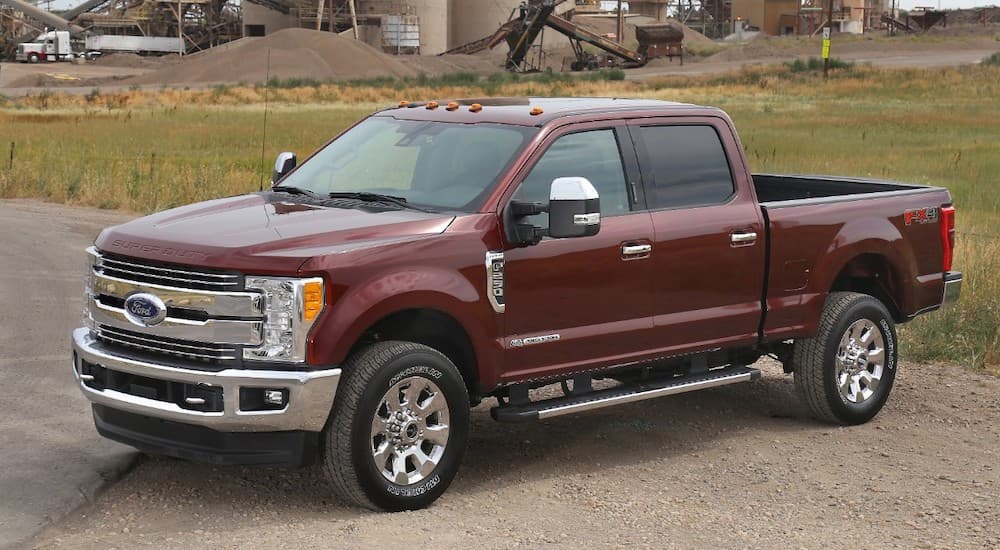If your job frequently consists of big burdens and heavy lifting, you might be in the market for a vehicle that will maximize productivity on the job site. And, if you’re looking to take advantage of the lower costs that a previously-owned vehicle can offer, look no further than a used Ford F-250 for sale.
Acquiring one at a reasonable price should be relatively easy given the rate of depreciation, making a used vehicle a cost-effective and worthwhile investment for your occupational duties. That said, some essential maintenance chores are recommended upon the initial purchase of your vehicle, and others have to be done at regular intervals to ensure its continued longevity. We’ll be going over both as an all-around guide to this much-needed assistance.

Estimated Annual Costs
It’s a well-known fact that all vehicles, regardless of their make or model, need routine service at regular intervals in order to maximize their lifespan. Larger vehicles, such as full-sized and heavy-duty pickup trucks, tend to need a little extra care. Depending upon how much work they’re subjected to and what tasks they’re used for, maintenance might need to be done more often.
When it comes to the Ford F-250 Super Duty, the annual cost of repairs remains below the $1,000 threshold for the first four years of ownership, and under $2,000 for the first six. If you only use your vehicle for work purposes, your repairs will likely be less frequent.
Routine Service Intervals
While the amount of work that each owner of an F-250 will vary from driver to driver, you can usually go by your odometer as an indicator as to when certain services need to be performed. Here’s a breakdown of some of the routine maintenance…
Change Oil and Rotate Tires Every 5,000 Miles
A heavy-duty truck has some substantial obligations in terms of work performance. While some cars can go up to 10,000 miles between oil changes, at least depending upon which brand of oil you use, a heavy-duty truck indisputably needs to keep its engine lubricated and free of deposits. As such, it’s recommended that the oil be changed every 5,000 miles to maximize performance. You should also get your tires balanced and rotated, as heavier loads and towing can cause more stress on the tread.
Lubricate Steering and Suspension Every 10,000 Miles
Similar to the necessity for oil changes and tire rotation, a larger-sized pickup truck places a lot more pressure on the steering and suspension, particularly if you’re someone who tows on a regular basis. This treatment should be done every 10,000 miles, or perhaps sooner, depending on the amount of driving you do and how much you tow or haul on a regular basis.
Address the Little Things Every 30,000 Miles
You should have your transmission serviced, your air filter replaced, and your ball joints and driveshaft lubricated about one-third as often as you have your steering and suspension retouched. These don’t need to be done as often as the previously mentioned items, but they’re just as important for the well-being of your vehicle. Your transmission is the key to your vehicle being able to go the distance and perform at its maximum potential. By taking care of it—along with the ball joints and driveshaft—you ensure the longevity of your truck’s capabilities.

Things to Inspect Regularly on Your Used Ford F-250 Super Duty
While some things only need to be given a once-over with every milestone, there are a number of upkeep tasks that should be steadily managed and always at the back of your mind. If you keep on top of these, you’ll surely keep your vehicle from getting old and tired far before its expiration date.
Tow Hitch & Fifth Wheel Platform
Even if you’re someone who doesn’t attach a trailer, mobile home, or a fifth wheel to your truck on a regular basis, there might come a time when you have to. Depending on what type of hitch receiver you currently have, it’s a good idea to check it periodically; many modern trucks have hitch guidance and surveillance systems, and ensuring that these are working properly will make all the difference when you’re hauling that heavy load.
Tire Pressure
One of the many conveniences of the modern age is that plenty of vehicles come equipped with a tire-pressure monitoring system. While these are effective in giving you a reading when you’re on the road, it’s still recommended that you do this manually every two weeks or so. Larger trucks have to carry more weight; as a result, having full tires becomes incredibly important. Periodically checking your spare tire is also a sound proactive measure.
Brakes
Here’s a brief science lesson that you might already be familiar with… When a large object is traveling at a considerable speed, it exhibits a force known as momentum. It takes a greater opposing force to stop an object with greater momentum, and this is why having your brakes inspected from time to time is so important. Maintaining the structural integrity of your brakes is one of the most crucial ways to keep you safe—not to mention the safety of the other drivers and pedestrians you share the road with.
Battery & Connections
We’ve all been there. You go to start your vehicle, and your battery is dead. It’s frustrating, and periodically checking the battery and its connections is how you can help prevent this from occurring. The connections that attach your vehicle to your battery can rust and corrode. Keeping an eye on them can help prevent costly repairs down the road.
Diagnostics
You’ll have to do this at your local dealership or a service center, and it’s very important if you plan on buying a used truck. Today’s vehicles are more complex than ever; a vast array of sensors and onboard computers monitor and manage all the necessary functions that allow your vehicle to perform at its best. A bad sensor or connection can adversely affect your vehicle, and having a diagnostics test performed can help prevent this from happening. Simple, inexplicable quirks like an inaccurate check engine light can be cured during a diagnostics test.
Fluids
Aside from the oil in your engine—which keeps the moving parts lubricated and helps remove the deposits that build up over time—other fluids are essential for your vehicle’s operation. Engine coolant allows performance not to be adversely affected by cold weather conditions and likewise allows your radiator not to overheat during operation. While it might seem mundane, windshield wiper fluid is a crucial component when rain or snow limits visibility. Checking your transmission fluid is different from checking your oil and ought to be done by a professional every few thousand miles or whenever you have your oil changed and tires rotated.

Recouping on Your Investment
The purchase of a vehicle is an investment. If you’re purchasing a used Ford F-250, you’re putting your faith in a pickup to perform the arduous tasks that sometimes accompany the workday. By getting the necessary routine maintenance performed at regular intervals, you can ensure that your purchase will go the extra mile for you, and that its performance will not suffer. When properly maintained, modern vehicles can go well past 100,000 miles and continue delivering the desired results. Recoup a return on your investment and elevate your quality of life; keep your truck like new with preventative and timely maintenance.

